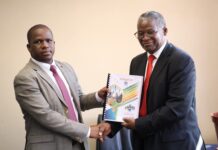Eswatini is taking strong steps to tackle and reduce the high cost of data in the country.
This was revealed by the Minister of Finance, Neal Rijkenberg, during the OPEC Fund Development Forum 2025. The Minister participated in Parallel Session Four, which was themed ‘Digital Acceleration for Growth and Inclusion’.
Rijkenberg was part of a five-member panel and acknowledged that data costs in Eswatini remain high, despite what he described as an “aggressive decrease” over the years when compared to other countries.
Electricity and Digital Access
Speaking on strategies and policies aimed at promoting access to digital transformation for inclusive growth, the minister highlighted the importance of infrastructure, specifically electricity, as a foundation for digital expansion.
He revealed that Eswatini currently enjoys 88 per cent electricity coverage and, with support from the World Bank, expects to achieve 100 per cent electricity coverage within the next three years. Additionally, the country is projected to reach 76 per cent access to potable water.
Rijkenberg also pointed to the role of free primary education in building human capital, noting that every child in Eswatini has access to primary schooling. He added that government is working to close gaps in high school education accessibility as well.
Tackling Data Costs
“The problem is that we have high-cost data in the country,” Rijkenberg said. “At the moment, there is a World Bank project aimed at streamlining and bringing the cost of data down.”
He acknowledged Eswatini as one of the top-performing countries on the continent in terms of electricity coverage and noted that 90 per cent of the population currently operates under 3G network coverage. He said there is a national parastatal working on expanding the fibre optic network to accelerate digital access across the country.
Creating a Sustainable Environment
To ensure the success of digital transformation, Rijkenberg emphasized the need for a sustainable base environment, stating that many countries fail to achieve this because they build on unsustainable foundations.
He cited Eswatini’s fiscal recovery since 2018, when the country moved from a 7.5 per cent deficit to a 2 per cent deficit, as a sign of progress toward sustainability.
“If we holistically approach development instead of isolating sectors, and build a sustainable environment, the private sector will naturally follow,” he stated.
He also mentioned that the regulator is working through the Universal Access Fund to improve network coverage in underserved rural communities.
Promising Growth Figures
“Right now, the country’s debt ratio stands at 40 per cent of GDP, and we are now seeing real growth,” he said. “In 2023, we experienced a 5 per cent growth rate; in 2024, it was 4.8 per cent, and this year we are targeting 7.9 per cent growth.”
“This means we now have an enabling environment to attract investments and assure the private sector that their returns are secure,” Rijkenberg concluded.








